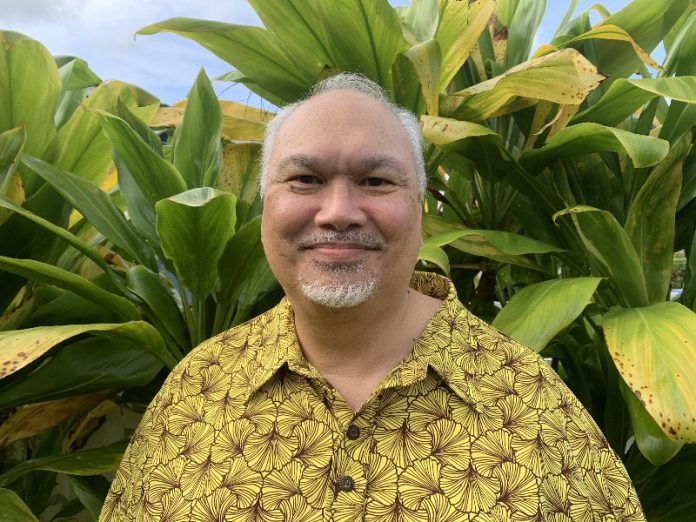For demonstrating outstanding leadership and commitment to indigenous students, advancing indigenous communities, and fostering the development of future leaders, Dr. Walter Kahumoku III of University of Hawaiʻi–West Oʻahu is the recipient of the 2021 Dr. Henrietta Mann Leadership Award.
The national award was presented to Kahumoku, executive assistant to UH West Oʻahu’s Chancellor Maenette Benham, on April 8 at the virtual Native American Student Advocacy Institute (NASAI) Conference by the College Board, a mission-driven not-for-profit organization that connects students to college success.
Kahumoku’s life work is committed to the educational success of Native Hawaiian learners, said Chancellor Benham.
“As the (former) director of Kauhale Kīpaipai (Educator Professional Development) at the Kamehameha Schools, he led statewide initiatives to improve teacher preparation as well as school leadership preparation,” Benham noted. “His nearly four decades of work in both K through 12 and higher education has elevated learning and teaching for indigenous peoples across the globe. Indeed, we at UH West Oʻahu benefit from his insight, his strategic acumen, and his aloha.”
The award is presented to Native individuals — American Indian, Alaska Native, Native Hawaiian, and Pacific Islander — and honors those individuals who exemplify the spirit of Dr. Henrietta Mann’s legacy. Mann is a member of the Cheyenne-Arapaho Tribes and the founding president of the Cheyenne and Arapaho Tribal College. She is a renowned leader in Native education and has been recognized nationwide for her leadership, vision, and inspirational guidance in Native education.
In a letter announcing the honor, Jamila Brathwaite, director of Access and Advocacy Programs with the College Board, said the award also recognizes those who have developed successful methodologies that have positively impacted countless indigenous students.
“Your exceptional work regarding Native Hawaiian and indigenous educational approaches and programs has impacted students and educators for many years,” Brathwaite wrote. “You have championed culture based education as the means of advancing Native communities and your contributions are nationally and internationally recognized.”
Brathwaite continued, “Dr. Henrietta Mann reminds us of the Hopi saying, ‘You are the ones we have been waiting for.’ The adage expounds upon the notion that each of us has the potentiality to lead. In this spirit, Walter, we cannot think of a more appropriate time and place to honor you for doing your best work as a leader, educator, mentor, researcher, writer and champion of culturally responsive teaching and learning.”
Kahumoku said that he is honored to receive the award.
“Mahalo nunui ia oukou — a deep and abiding gratitude to all who’ve walked and sometimes ran or crawled through this life expedition with me,” Kahumoku said. “You continue to inspire and encourage me to take those steps forward to support the education and wellbeing of Native students, their families, and wider communities.”
According to the NASAI Conference website, Kahumoku is a former school administrator, writing specialist, high school teacher, and director of forensics. His publications and presentations advocate for cultural, linguistic, and indigenous educational approaches that advance meaningful, relevant, rigorous, relationship-based, and responsibility-focused leading, teaching, and learning.
As a visionary and architect of Native Hawaiian and indigenous educational approaches and programs, Kahumoku is recognized and sought after locally, nationally, and internationally.
“I am here because of the brilliance of those who’ve come before me and hope that our collective work together — whether in the halls of Congress, at the NASAI Conference, or on the gentle slopes of the arid southside of the Kohala mountains — will help indigenous communities in this country and throughout the world thrive,” Kahumoku said.
